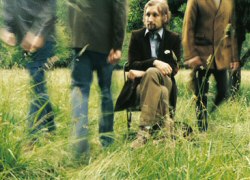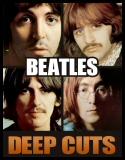
A couple of questions with Evan Slavka of Marjorie Fair
04/16/2007
Music Home / Entertainment Channel / Bullz-Eye Home
ALSO: Marjorie Fair was featured in our The Best Albums You've (Probably) Never Heard feature.
Bullz-Eye: For those just learning about the album now, can you give a nutshell summary of your career prior to its release?
Evan Slavka: Prior to the release of our record, Marjorie Fair – we were called Parlour at that time – had settled into a downtown loft around late 2000. There, we wrote and rehearsed the songs that eventually were to be recorded. During that time, we played a bunch of shows in the LA area. We were having a good time playing parties at our loft and just sort of taking in the experiences of being in a new city. Not long after we had arrived, some music industry types started to appear at our parties and shows. We enjoyed recording our music, but mostly we were into playing live. So, for awhile, there really wasn't going to be any official recordings. Then, before we knew it, we were negotiating a deal with Capitol Records. Despite our general suspicion and mistrust of the music business, we decided to do a tour of duty with a label that laid claim to such a rich history, if for no other reason than to share the same logo as the Beatles, Beach Boys, and Pink Floyd records. Makes sense, huh?
BE: Do you recall any anecdotes from the recording of the album?
ES: The recording of the album was a great experience, although, true to Parlour tradition and form, it was sure to include a fair share of high drama, tension, and absurdity. One of the best moments was having Billy Preston performing on “Hold on to You.” He played like no one else can, and the only time he broke his odd silence was to say that he thought the tune was real good. That made me feel pretty cool for a bit. Then after the compliment and a smile, he disappeared out the studio doors like a ghost. Who knew he would have a posse? But he did. Other cool moments include Jim Keltner playing drums, Jon Brion batting .179 on “tracks played” to “tracks kept”. (They were all exceptional, but the deadline was nearing!) Rob Schnapfs using sign language through the glass window, indicating that if I continued to try and record anymore tracks, I would be a dead man! I must credit Rob's ability to keep us on track, and his endless humor despite the period of time a friend of the band spent relaying our production ideas via the use of a clipboard. Fun stuff!
BE: Did you expect the record to have a better commercial reception than it did?
ES: Not particularly. I expected us to gain more ground in the "underground" circles. I figured the discerning indie types and musos would get it, and then if things rolled along, eventually, it would have at least a decent chance of bubbling up into a more mainstream audience. When we finished the single for the US release, we got lots of enthusiasm, which seemed to indicate that had that song gotten out there…and a lot of people may have, in fact, gone out and bought the record…but ultimately, we made a record intentionally for those whose tastes are more eclectic. We could never pretend to be really mainstream, but we even leaned more specifically to our less-commercial side, hoping to establish a loyal base of listeners who would worship and follow us for years to come, hits or no hits. However, to use a gambling term, I think ultimately it ended up being a "push.” Not only did we not become the darlings of KROQ, but, moreso, I think a large part of the so-called indie underground were never really even exposed to the record after all. That said, we did have a good run overseas…and I think we are quite popular in the Philippines. For real.
BE: Are you pleased to find that it still maintains enough of a following to make its way into this piece?
ES: I am very pleased that this record and period of time warrants such attention. I’d like to think we made a record that can stand outside of genre and music trends. That is all we really tried to do. Commercial success would’ve made some transitions easier, I suppose, but, ultimately, it is nice to think that people may continue to discover the music at an "organic" pace. Hopefully, it will continue to find new listeners.
BE: What are you doing now?
ES: Living in a van down by the river.
Check out Marjorie Fair's official site for more info.






